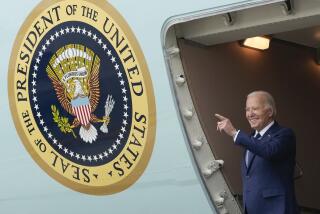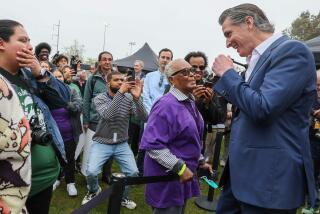Politics, personalities drive the decision on who will be pope
It remains to be decided when the Catholic world’s cardinals will lock themselves away in the Sistine Chapel to elect the next pope. But the undeclared candidates to succeed retiring Pope Benedict XVI are already campaigning in the gilded salons of Vatican apartments and over grappa and espresso in restaurant alcoves.
Cardinals have begun descending on the Eternal City to attend Benedict’s last audience at St. Peter’s Square on Wednesday and an informal farewell the next day for the first pope to abdicate in nearly 600 years.
Most will likely remain in Rome until the papal conclave, which under current rules can begin no sooner than March 15. That leaves more than two weeks for the red-robed princes of the faith to caucus and cajole over who among them is best suited to lead the world’s 1.2 billion Catholics.
Openly jockeying for the papal miter is frowned on and rarely successful, Vatican watchers note, reciting the cautionary adage that “whoever enters the conclave a pope comes out a cardinal.”
But behind-the-scenes politicking has been an element of the succession rituals for centuries, and the interregnum between Benedict’s departure and the Sacred College of Cardinals’ sequestered conclave will provide an unusually long opportunity for constituencies to make their case. Conservative status quo or modernization? Experienced father figure or inspiring young reformer? Traditional European leadership or a fresh perspective from the Southern Hemisphere?
Vatican officials are considering a rules change that would move up the conclave, perhaps as early as March 10, ensuring that a new pontiff is in place in time to preside over Holy Week. Some cardinals, though, are embracing the opportunity to extend the vetting.
“The most important thing is to choose well, and we’ll take the time necessary to do that,” Chicago’s Cardinal Francis George told reporters Sunday, urging fellow cardinals not to rush the process.
Extra time together in Rome without the solemn atmosphere of mourning might be particularly helpful this time, given the daunting tasks facing a church deeply shaken by clergy sexual abuse and its cover-up, as well as disclosures of corruption in the Vatican administration.
“Cardinals are not really allowed to be political, but in church-speak ‘the murmurings’ have already started,” Father Thomas Rausch, a theology professor at Loyola Marymount University, said of the cardinals huddling in Rome. “This is an opportunity to have an informal kind of convocation in which they try to sound each other out about who would be the best candidate, to see where alliances lie. They might have a little more time to do that this time, which is probably all to the good.”
All 117 cardinals eligible to vote in the conclave were appointed by either Benedict or his predecessor, Pope John Paul II, and all share much of their patrons’ conservative doctrine. The composition is disproportionately Western, with 62 Europeans and 17 from North America. That could prove a barrier to the emergence of a pope from the developing world, where the church is ascendant, such as 64-year-old Peter Kodwo Appiah Turkson of Ghana, 63-year-old Odilo Scherer of Brazil or Luis Antonio Tagle, 55, of the Philippines.
“The thing I’m hoping for most as a Catholic and as an academic is that we get a pope who will take on other issues that are important to Catholics,” said Mathew Schmalz, a professor of religious studies at College of the Holy Cross in Worcester, Mass. Poverty and injustice are much bigger concerns in Africa, Latin America and Asia, he said, compared with Western congregations’ focus on such divisive sexual issues as celibacy and contraception.
Even in Europe and North America, there is little consensus on controversial matters confronting the church, including homosexuality and the role of women in the clergy, Schmalz said, “and I don’t see there being a critical mass of cardinals” eager to have those conversations.
Whoever emerges as pope should have the skills to clean up “the mess” that is the Vatican Curia, the administrative bodies rocked by financial scandals and embarrassing leaks of sensitive documents, even from the pope’s own papers.
While language, administrative and diplomatic skills are all needed, a choice is often made largely on personality and how well a prospect is known outside his archdiocese or Vatican office, Schmalz said.
Christopher M. Bellitto, a papal historian at New Jersey’s Kean University, sees the choice of Benedict eight years ago as the result of indecision among cardinals unwilling to make a bold move toward modernization. He said he hoped the conclave would tackle the church’s problems head-on this time.
“Who is going to get us not just past but through the sex abuse scandal? It’s going to mean someone who can take very strong action against the archbishops who just moved these guys around,” he said of church leaders in Boston, Los Angeles and Ireland who sought to hide pedophile priests rather than turn them over for prosecution. As the cardinals mull the qualifications they seek in a pope, Bellitto said, “I hope to hear words like ‘accountability’ and ‘trust’ being spoken.”
While this run-up to the conclave could be longer and more relaxed in the absence of mourning, Bellitto said he doubted the cardinals would be any more aggressive in their lobbying of favored candidates than if they were gathering for a pope’s funeral.
That said, the selection rituals will be subject to politicking and power-brokering, as they have been since the Renaissance, he said, recalling the brazen influence of the Borgias and Medicis.
“There’s nothing new in that,” Bellitto said of back-room deal-making. “They’ve been doing it for 2,000 years.”
ALSO:
U.S. drone strikes up sharply in Afghanistan
South Africa replaces lead detective in Pistorius inquiry
Syria blast leaves at least 53 dead, 235 injured, officials say
A foreign correspondent for 25 years, Carol J. Williams traveled to and reported from more than 80 countries in Europe, Asia, the Middle East and Latin America.
More to Read
Sign up for Essential California
The most important California stories and recommendations in your inbox every morning.
You may occasionally receive promotional content from the Los Angeles Times.











